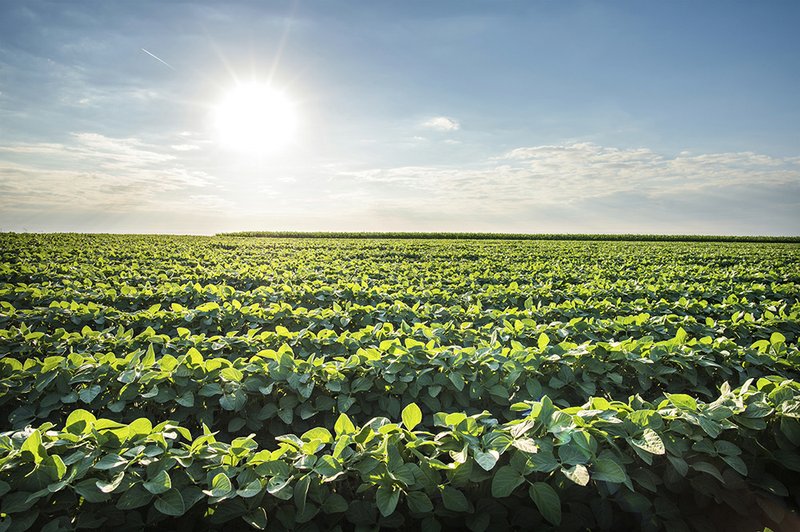Three farmers from the Three Rivers Edition coverage were among those who garnered 2015 honors for their yields in soybeans and corn and who will be feted at upcoming events.
Billy W. Tripp of Griffithville in White County placed first in the year’s Arkansas corn yield contest, the Irrigated Division, with a yield of 343 bushels per acre.
Perry Galloway and Charles Galloway, brothers, were two of the top three soybean producers in the Arkansas soybean yield contest. Perry, of Woodruff County, produced 108.759 bushels to the acre, and Charles produced 100.935 bushels per acre, according to the Arkansas Soybean Promotion Board and Arkansas Soybean Producers Association.
The third top producer in the top three of the 98 soybean producers participating in the contest is Matt Miles of Desha County in southeast Arkansas, with 108.717 bushels per acre.
Tripp placed second in the 2014 contest and was determined to win this year, he said. The contest has been sponsored for 50 years by the National Corn Growers Association. Winners receive national recognition in such publications as the NCYC Corn Yield Guide, as well as cash, trips and other awards from participating seed, chemical and crop-protection companies.
Tripp and his wife, Kim, will be honored at the Commodity Classic at New Orleans in early March and will receive a trophy.
Tripp, Kim, and Tripp’s father, Billy Ray Tripp, operate a 3,000-acre farm concentrating on corn. Billy W. Tripp’s grandfather started the farm with cotton and strawberries; then Billy W.’s dad took over. Now Billy W. and Kim and their son, 14-year-old Tate Wayne Tripp, representing the fourth-generation farmer in the family, have grown soybeans, rice, wheat and peanuts, with about 1,500 acres now planted in corn.
Billy W. Tripp won in the Irrigated Division. The other division is the Nonirrigated category.
“We hoped it would happen,” Tripp said of the win. “We were determined to buckle down and do it, but you’ve got to get up and go and hope it will be good. It does not happen overnight. It takes a lot, and it’s hard to do. We use lots of fertilizer. And getting in the water, you’ve got to stay on it. Farming is difficult. But we’ve got to be optimistic and think everything will work out. Farmers always think it will be better next year.”
Tripp said 2015 was challenging, with planting delayed by the cool wet spring. He said his good land was a major factor in the corn yield, as well as the DeKalb seed he used — DKC67-72 corn seed.
“It is the best! Monsanto is a big company,” he said, referring to the genetics and micronutrients employed in their products.
The Tripps also own and run Searcy Farm Supply, 1701 Eastline Road. Kim Tripp is manager of the business, and Billy W. Tripp’s dad works there, too. Billy W. and Kim, who have had the store since 2001, also own a fertilizer business.
The Galloways will be recognized at the annual soybean meeting at Stuttgart on Jan. 26.
In Woodruff County, the Galloways’ farm is at Gregory, said Richard Klerk, Woodruff County extension agent in agriculture.
“I was there when they harvested the field for the contest. I was there to watch,” Klerk said. “The Galloways started with cotton years ago and went on to produce soybeans, rice and grain sorghum. They have quite a history of farming.”
Cash prizes will be awarded at the soybean association’s annual meeting to the top three contestants in each division producing at least 60 bushels to the acre.
“We have been in the yield contest a number of years and have several times been in the top one, two and three places, and always real close to the 100-bushel yield, in the 90-plus,” Perry Galloway said. “I made my mind up to try harder and to try different things [this year].
“We had a good emergence at planting, and it was pretty good weather conditions during the growing season. We used a new seed treatment and an inoculate. I do feel this got us another 5 to 10 bushels an acre and put us over the 100 bushels. I have farmed all my life, from the family farm and then expanded into Galloway Cotton Farms in 1990.” He said the farm’s acreage is 8,000.
The inoculate energizes the nitrogen in the soybean plant, Galloway said. The plant produces its own nitrogen through a bacteria present in the soil, and the inoculate encourages more of the strain of bacteria, he said.
He said he looks forward to the Stuttgart forum. “It’s always a good time,” he said.
What will 2016 bring?
“I am not real optimistic on the profitability of farming,” Galloway said, “but I always welcome
a challenge, and making changes, trying new things — we are always trying new things.”
The soybean contest is divided into seven geographic regions and one statewide conventional (or nonmodified organism) category, a press release states. The divisions include the Northeast Delta, the Northeast, the White River Basin (of which the Galloways are associated), the Grand Prairie, the East Central Delta, the Southeast, the Western and the conventional category.
